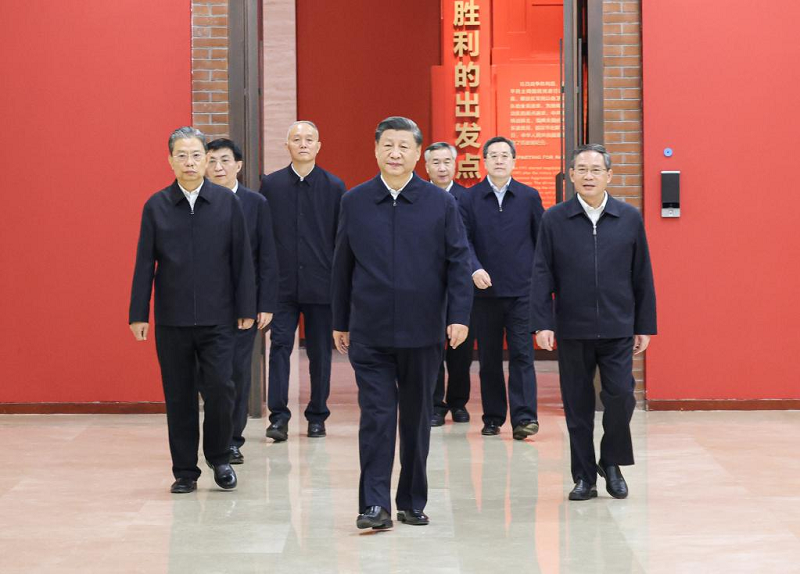Profile: With popular mandate, Xi Jinping spearheads new drive to modernize China

Xi Jinping leads members of the Standing Committee of the Political Bureau of the Communist Party of China (CPC) Central Committee to visit an exhibition, which features the history of the 13 years of the CPC Central Committee in Yan'an, at the Yan'an Revolutionary Memorial Hall in Northwest China's Shaanxi province, Oct 27, 2022. [Photo/Xinhua]
From the 20th CPC National Congress to this year's "two sessions," a new cohort of officials have assumed positions of governance, including members and alternate members of the Party Central Committee, ministers, and provincial-level Party chiefs. Xi urged them to strive diligently and avoid letting down the expectations of the people.
According to Party insiders familiar with the matter, these new leading officials "share some common traits," including their strong abilities in terms of political judgment, comprehension, and execution.
In the meantime, the military has also completed its leadership transition, with a new Central Military Commission team and a new defense minister.
In early November, Xi visited the military's joint operations command center and called for "comprehensively strengthening military training and preparedness. " He emphasized multiple times "the absolute leadership of the Party over the people's military. "
According to Xi, the Party's leadership defines the fundamental nature of Chinese modernization.
Given the immense size of the Party and the country, it is impossible to achieve anything without the authority of the CPC Central Committee and its centralized and unified leadership, as well as the conformity of the nation, Xi said.
"General Secretary Xi has the charisma to unify the whole Party. He is our backbone as the nation charges ahead on the new journey toward modernization," said Cai Hongxing, president of Yanbian University, who is also an NPC deputy.
A NEW START
The NPC is considered a major platform to turn the Party's propositions into the will of the nation. This means that grand strategies for Chinese modernization, laid out at the 20th Party congress, are being translated into concrete plans at the "two sessions. "
In 1979, late Chinese leader Deng Xiaoping introduced the term "Chinese modernization" at the beginning of the reform and opening-up as a reference to Xiaokang, or a well-off society. After achieving this goal, the CPC proposed the goal of a moderately prosperous society in all respects.
Based on media reports, Xi first used the term "Chinese modernization" in a public speech in December 2015 while leading efforts to formulate a development blueprint aimed at propelling the nation toward a moderately prosperous society in all respects.
Six years later, during the centennial celebration of the CPC, Xi declared that this objective had been achieved.
Xi has continued to refine the strategic deployment of Chinese modernization, moving from building a moderately prosperous society in all respects to embarking on a new modernization journey.
At the 19th CPC National Congress, he established a "timetable" for achieving modernization, and at the 20th Party congress, five years later, he presented a "road map" to realize this goal.
Xi summarized five major features of Chinese modernization: a huge population, common prosperity for all, coordination of material and cultural-ethical advancement, harmony between humanity and nature, and peaceful development. This sketch of Chinese modernization is now even more precise, well-conceived, and feasible.
"He has given a lot of thought to modernization and put it into action. Throughout his career, he has worked from inland to coastal regions and from local to central levels. No matter where he worked, Xi was an active reformer and broke new ground in advancing modernization," said David Ferguson, who edited four volumes of the English version of "Xi Jinping: The Governance of China. "
The objectives for 2023 are to do solid groundwork for building a modern socialist country. The five years starting from 2023 is deemed a crucial phase.
The national legislature has approved the government's growth target of around 5 percent for 2023, which is two percentage points higher than the actual growth last year. This means China's economic growth in a single year is equivalent to the GDP of a mid-sized developed European country.
But China has 1.4 billion people, lowering the country's development ranking in terms of per capita figures. Explaining the 5-percent growth target, Xi said if China will lift per capita GDP to that of a midlevel developed country by 2035, it is imperative to maintain reasonable growth on the basis of improving quality and efficiency. And China has the capacity to do so.
"High-quality development is the primary task of building a modern socialist country," he said.
Almost all 31 provinces, autonomous regions, and municipalities on the Chinese mainland had set higher growth targets. Shanghai has set its target at 5.5 percent, while Xinjiang and Tibet have set their targets at around 7 percent and over 8 percent, respectively.
Wang Xiangming, a researcher at the Renmin University of China, said a notable change in Chinese society after the 20th Party congress is that people have a stronger sense of developing the economy. "Without a solid material foundation, it is impossible to achieve socialist modernization. "
A major change is a shift in COVID-19 response. Over the past three years, China's rigorous response measures have effectively protected the lives and health of the people. Last November, Xi presided over a Party leadership meeting to adjust COVID-19 response measures. Three months later, it was declared that China had emerged victorious from the pandemic.
Kristalina Georgieva, head of the International Monetary Fund, said China's optimization of its COVID-19 policy will likely be the single most important factor for global growth in 2023.



